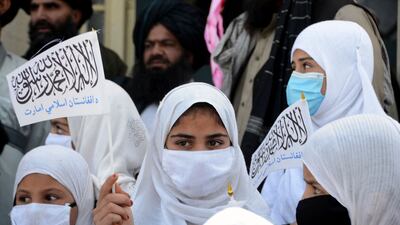The US said on Friday that it has cancelled planned talks in Doha, Qatar, with the Taliban after the group shut girls' secondary schools.
“We have cancelled some of our engagements, including planned meetings in Doha around the Doha Forum, and have made clear that we see this decision as a potential turning point in our engagement,” State Department deputy spokeswoman Jalina Porter said.
The Taliban, which seized power in August and is eager for international recognition, shut down girls' secondary schools this week hours after reopening them.
“This decision by the Taliban, if it is not swiftly reversed, will profoundly harm the Afghan people, the country's prospects for economic growth and the Taliban's ambition to improve their relations with the international community,” Ms Porter told reporters.
“For the sake of Afghanistan's future and the Taliban's relations with the international community, we urge the Taliban to live up to their commitments and to their people.
“We also stand with Afghan girls and their families, who see education as a path to realising the full potential of Afghanistan's society and economy.”
The Taliban's decision to keep schools for girls shuttered came after a meeting of senior officials late on Tuesday in the southern city of Kandahar, the movement's de facto power centre and conservative spiritual heartland.
It followed months of work by the international community to address the issue of supporting teacher stipends and came as Afghan girls were eagerly heading back to school for the first time in seven months.
When the Taliban returned to power, they promised a softer rule compared with their first regime from 1996 to 2001, which became notorious for human rights abuses.
They claimed to respect women's rights in line with their interpretation of Sharia and said girls would be allowed to study through to university.
But the Taliban have imposed a series of restrictions on women, effectively banning them from many government jobs, policing what they wear and preventing them from travelling outside of their cities alone.
In a joint statement on Thursday, the foreign ministers of Britain, Canada, France, Italy, Norway and the US, plus the high representative of the EU, said the Taliban's decision will harm the group's prospects for legitimacy.
The signatories to the statement notably included Norway, which hosted important talks between the Taliban and several western diplomats in January.
UN High Commissioner for Human Rights Michelle Bachelet said on Wednesday that “the denial of education violates the human rights of women and girls”, leaving them “more exposed to violence, poverty and exploitation".
The head of the UN's educational organisation Unesco, Audrey Azoulay, also criticised the Taliban's move, calling it a “major setback".
“Access to education is a fundamental right. Unesco reiterates its call: girls must be allowed to return to school without further delay,” she said.









